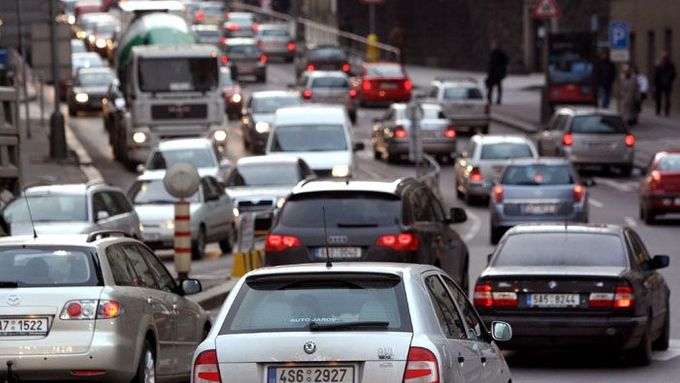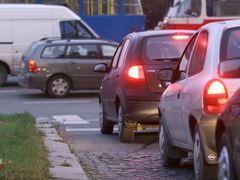Prague - Automobile traffic in the capital city is going to undergo a small revolution. Prague City Hall plans to lower the maximum speed on selected streets. In future, a speed limit of 50 km/h could be applied all over the city.
City Hall also wants to monitor the speed of vehicles thoroughly, so it will install speed cameras at some twenty places in the years to come.
Making drivers slow down is one of measures the city hall wants to put in place to curb excessive noise. Prague has the biggest proportion of people living in an overly noisy environment. And car transport is the main source of the noise.
"In the vicinity of main roads is the biggest territory where noise limits are exceeded and it is where the largest number of citizens live affected by excessive noise," says an action plan for reducing noise in Prague, which the capital city had to work out in line with a European Union requirement.
Apart from the fact that people living next to a busy street cannot sleep well, cannot concentrate properly and feel irritated, noise is to blame also for other problems. I can start up serious civilization diseases, such as diabetes and high blood pressure.
Driving 50 kmh in front of Nuselský bridge
The city hall has already reduced the speed limit on 5. května street between Spořilov and Michle from 80 to 70 kilometres per hour. And still in the autumn, it wants to lower the maximum speed further to the Nuselský bridge to 50 kilometres.

The Prague artery road, which includes the 5. května streets, is one of the busiest and noisiest roads in the country. A group of local residents have even filed a lawsuit against the city hall over excessive noise caused by cars.
Besides the 5. května street, on which cars arrive in Prague's centre from the D1 motorway from Brno, the authority also wants to lower speed limits in Chlumecká and Kbelská streets.
Smoothing the traffic flow
Prague's councillor for the environment, Petr Štěpánek, said lower speed limits would not necessarily result in more traffic jams. It would have the opposite effect.
"Paradoxically, the traffic flow should be smoother," Štěpánek told Aktuálně.cz. He added that in some European cities, for example in Scandinavia, speed limits of 50 kilometres per hour, and even 30 kmh in densely inhabited neighbourhoods, are applied already now.
"I regard it as a wise step," said Štěpánek. Reducing speed limits not only helps to curb noise near streets, but also cuts car emissions and fuel consumption and boosts traffic safety considerably, he added.
Night trams unlikely to slow down
Prague's action plan for noise reduction also involves an across-the-board reduction of the speed limit for night trams to 40 kilometres per hour.
But City Hall tries is trying to avoid this measure. According to Štěpánek, negotiations are under way with health officers on other ways to bring the noise generate by trams within the set limit at night.
"We do not want to put the public city transport at a disadvantage. It is much more friendly to the environment than cars are and it is the most important alternative to cars," said Štěpánek. Prague wants to continue replacing the tracks for less noisy ones and to install noise barriers on tram chassis.
Bitumen instead of cobble stones
Other main measures aimed to lower excessive noise in the capital city include a substitution of cobble stones on the streets with bitumen.
"This is enormously effective," said Štěpánek. Prague has been recently replacing stone with bitumen in Anglická and Budějovická streets, for example.
City Hall also plans to install noise barrier walls on a massive scale and to replace old systems for new ones. The anti-noise measures will claim hundreds of millions to billions of crowns. For example a noise barrier wall on 5. května street should cost CZK 100 million.
Adapted by the Prague Daily Monitor.

